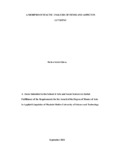| dc.description.abstract | This study focuses on tense and aspect in the verb structure of Lutsotso, a dialect of the Oluluhya macro-language. While numerous studies have been conducted on the analysis of the Oluluhyia macro-language at phonological, morphological and syntactic levels, these studies were exclusive of inflection on the Lutsotso verb. The present study discusses the morphological configurations of tense and aspect in Lutsotso. The study also establishes that the Lutsotso verb inflection can be checked for correct derivation using the feature checking theory of the Minimalist Program. The Minimalist Program is used as a model of description in this study as it accounts for the morpho-syntactic nature of language. The feature checking theory and the principle of full interpretation necessitate verb movement for feature checking in structure building process. The study uses primary and secondary sources of data. Primary sources include actual words elicited from respondents, audio-recordings and video-recordings archives. Secondary data was obtained from the library. Data was collected through informal interviews, elicitation technique, translation tests and texts written in Lutsotso. Data was analyzed at different levels, that is, constituents of Lutsotso verb, the inflectional category of tense and the category aspect. The study area was Kakamega Central Sub County, in Kakamega county. Purposive sampling was used in the identification of informants. The study targeted native speakers of Lutsotso and a sample size of one hundred and fifty native speakers among them twenty informants. The study established that the Lutsotso verb consists of more than one morpheme expressing a particular grammatical meaning, that there is a combination of morphemes in the description of tense and aspect in Lutsotso. The inflectional features of the Lutsotso verb are also examined as part of the study's morphological analysis. The verb is composed of features such as the root and prefixes, suffixes and the final vowel. Further, it gives the basic syntactic structure of a Lutsotso sentence. The Lutsotso tense system includes the past, present and the future. From this analysis, the following conclusions are made: Firstly, tense in Lutsotso is a grammatical category marked morphologically by various inflectional morphemes. There is a combination of morphemes in the description of tense and aspect in Lutsotso. Secondly, Lutsotso is an SVO structure language and the analysis of its basic sentence structure can adequately be described using the Minimalist Program. The feature checking theory of the Minimalist Program is suitable in the analysis of tense and aspect in Lutsotso. The study has established also that tense and aspect categories interact largely by co-occurring in the same verb phrase. Indeed, it is difficult to study one category without referring to the other. The study will contribute to the understanding of the morpho-syntactic nature of tense and aspect in Lutsotso. | en_US |

